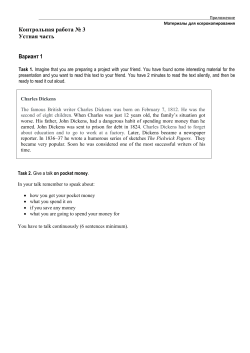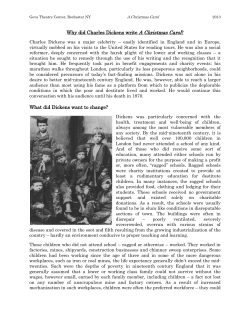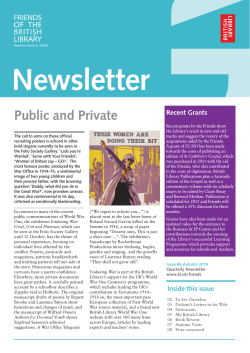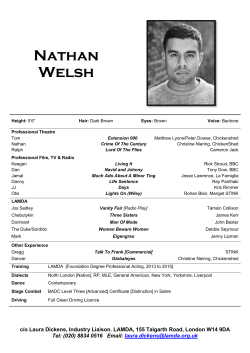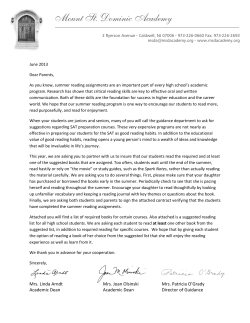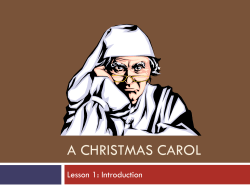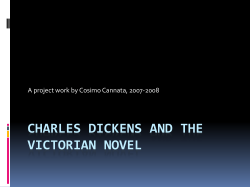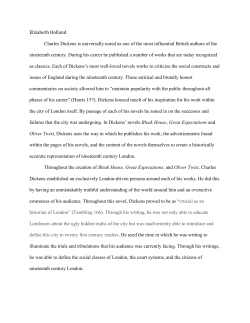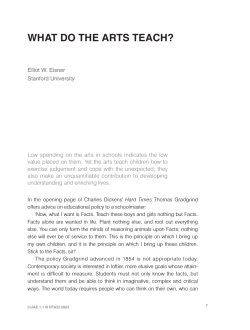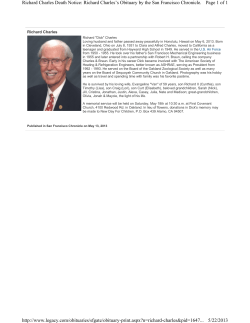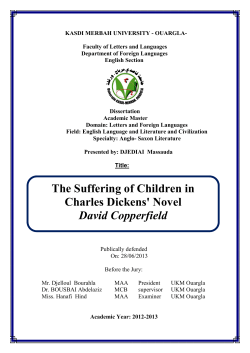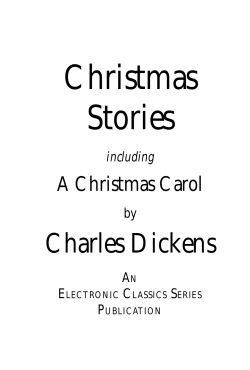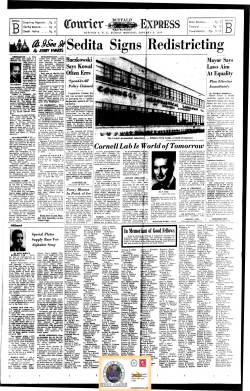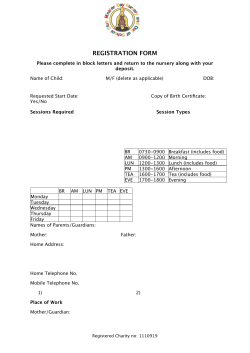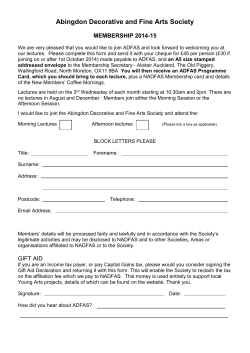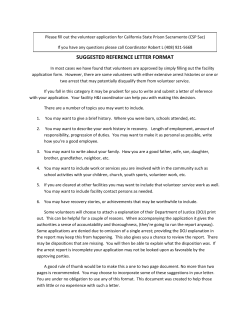
Charles Dickens and the Social Novel
Charles Dickens and the Social Novel The overriding social and political problem facing British society in the early decades of the Industrial revolution was what to do with the poor. In the long run, industrialization led to a growing standard of living for workers, but the short run was a different story. Overcrowded, slums, inadequate housing, high infant mortality, appalling working conditions and bare subsistence wages were the fate of most. To make matters worse, neither the political nor the economic theories of the time presented much hope for improvement for the condition of the working class. Classical economics taught that workers should expect only a bare subsistence wage—“The Iron Law of Wages”—to pay higher wages would only encourage the poor to have more children and thus drive down the value of labor and create only more misery. Most liberals rejected the idea of social legislation designed to monitor the factories and regulate child labor and protect women workers as intolerable invasions of the sacred right of property. Only a few visionary socialists voiced ideas like government providing unemployment insurance for workers. Liberals deplored the misery of the poor, they often gave generously to charities, but they firmly rejected any government intervention in the name of property rights and the free market. For the most part, Liberals in Europe looked on the poor with a mixture of sympathy, fear, and contempt. Here is a fairly typical example: [The slums] swarm with dirty unwashed men, who bear, Cainlike, on every brow a brand that warns you to avoid them with rude, coarse women, whose wild language, fierce eyes, and strange lascivious gestures strike terror to the spectator’s heart. Children swarm about the road, halfnaked, shaggyheaded little savages, who flock about you and, with piteous whine, solicit charity for their dying father—that broad shouldered, burlylooking [fellow] who has just reeled from the tavern door. (Marriot, p. 113) Above all, the poor represented a threat to decent, orderly citizens. Their drunken untamed emotions could explode at any moment into violent criminal activity or, even worse, revolution. Charles Dickens (18121869) If any one man should be given credit for changing that fear into pity and awakening the conscience of Liberals to the conditions of the slums and the poor who lived there, it is the novelist Charles Dickens. Dickens created the modern Social Novel. With Dickens the novel 2 became a potent tool for exposing social injustice, poverty, and the inadequate responses of gov ernment to these problems. As Roger Ebert recently put it: “Dickens grew up in a world of workhouses for children, child prostitution, "charity" institutions run with cruelty and greed, schools that taught nothing and were run for profit, and people who preyed on children, starved and mistreated them, and praised themselves for their benevolence.” Dickens was able to accomplish this because he was a great writer who just happened to come from a life of poverty. Dickens was born into a middle class family in 1812, the second oldest of 6 children. His father, John Dickens was a government clerk, a position that granted him some claim to social status and a steady income. John Dickens adopted an air of gentility he could not reasonably afford. He loved to buy expensive clothes, and enjoy good wine and impress his friends. Charles' mother, Elizabeth Dickens had been a servant to an aristocratic lady; like her husband, she tried to maintain an image of gentility that the family could not afford. In short, the Dickens family did not live within its income. They employed a maid, Mary Weller, who used to read ghost stories to young Charles leading to his fondness for ghost stories and grotesque characters. Gradually debt problems accumulated and the family began selling possessions to satisfy their creditors. In 1822, John Dickens was transferred to London and the family was forced to settle in a poor neighborhood—not all of their furniture made the trip since it necessary to sell it to meet some outstanding debts. Creditors sent bill collectors around to knock on their door and demand payment; large men hung around the front door to the family home and made abusive comments. The family had to sell their collection of books. The family continually had to move to more undesirable lodgings because of eviction. Nothing seemed to help; Mrs. Dickens decided to open a school—she had a brass plate made for the door and distributed handbills but no prospective students ever came. All of his life, Dickens felt anger towards his mother; as he put it: [My mother was a woman] “who had at no time been remarkable for the possession of a very clear understanding. [She was likely to entertain her guests] with a lament over her fallen fortunes.” (Hibbert, pp. 4849) Finally, at age 12, young Charles was removed from school and sent to work in a warehouse. The young man worked 12 hour days standing in a drafty warehouse, wrapping cans of shoe polish and labeling them by hand. It was boring work but to young Charles, it was a 3 crushing blow. He felt abandoned by his parents and disgraced by his situation. He wanted to continue school, but instead he found himself surrounded by the precisely the sort of people that middle class persons wished above all to avoid: No words can express the secret agony of my soul as I sank into this companionship, as I compared these everyday associates with those of my happier childhood; and felt my early hopes of growing up to be a learned and distinguished man crushed in my breast. The deep remembrance of the sense I had of being utterly neglected and hopeless; of the shame I felt in my position cannot be written. My whole nature was so penetrated with the grief and humiliation of such considerations, that even now, I often forget that I am a man; and wander desolately back to that time of my life. (Hibbert, p. 57) Worse blows were in store for the family. In 1823, his father was arrested and sent to debtor's prison and the family went along. There was no room for Charles and he was sent to live in a rooming house for homeless boys. He deeply resented all of this and blamed his parents for not understanding the hurt he felt: “It is wonderful to me, how I could have been so easily cast away at such an age. No advice, no counsel, no encouragement, no consolation, no support from anyone that I can call to mind. I know that, but for the mercy of God, I might easily have been, for any care that was taken of me, a little robber or a little vagabond.” (Hibbert, pp. 6869) His orphan hero, Oliver Twist, was not merely a literary creation, but an expression of Dicken’s personal experience, not to mention his most private anger and fear. As he put it in Great Expectations: In the little world in which children have their existence, there is nothing so finely perceived and so finely felt, as injustice. It may be only a small injustice that the child can be exposed to; but the child is small and its world is small. (Hibbert, p. 34) He became familiar with the inside of debtor’s prison; on Sundays, he would be taken to the prison to have dinner with his family. After 6 months of this misery, fortune changed, his father inherited some money when his mother passed away and the family was able to pay their debts and win release from prison. Young Charles could now go back to school, but he was haunted by memories of poverty and he dreaded that his schoolmates would learn of his warehouse and prison experience. All of his life Charles Dickens would be obsessed by prisons. In the 1840s, when as a worldfamous novelist, he visited New York, the first building he described was an infamous prison: “Crossing Broadway into the Bowery, [I came] to a dismal frosted pile 4 of bastard Egyptian [architecture], like an enchanter’s palace in a melodrama!—a famous prison called The Tombs.” (Hibbert, p. 61) He was so ashamed of these experiences that he never told his wife and children about them and refused to write an autobiography. The Poor Law of 1834 What to do with the Poor? In 183744 Great Britain experienced the worst economic depression that ever afflicted the British people. The old preindustrial welfare system was tied to local parishes of the church. Ideally each community would take care of its own. This system was simply overwhelmed by the growing numbers of the poor. Many economists argued that any public money spent on the poor, outside the limits of Christian charity amounted to a tax on the wealth of society with no tangible returns: “Every penny bestowed that tends to render the condition of the pauper more eligible than that of the independent laborer is a bounty on indolence and vice.” Parliament passed one of the most controversial laws in English history to modernize the social welfare system—The Poor Law of 1834 has been described as “the first great piece of social legislation based upon scientific and economic principles.” The Law did create a centralized, efficient administration and placed the welfare system under government supervision rather than under the control of the Church. But every other aspect of this legislation was designed to encourage the Poor to find work—if life was made unpleasant enough, even the idle, ablebodied poor would prefer employment to the life in the workhouse. One child recalled the day his family entered a workhouse: “If we could have seen what was driving us so relentlessly up that hill to the workhouse we should have seen two stern and terrible figures—Tyranny and Starvation. We were part of Malthus’ ‘superfluous population’ and our existence only tended to increase the poverty from which we suffered.” (Wilson, pp. 1213) The system worked like this: ablebodied poor were required to report to a Local Workhouse for poor relief. These workhouses created by Parl. were drab affairs indeed—part warehouse, part jail. They were purposely made as unpleasant as possible. Families were broken up and the sexes were segregated. Women and children were often put to work picking Oakum, pulling apart old lengths of Hawsers from ships—the work was intentionally made boring, dirty and meaningless. A regimen of silence was imposed. No talking was allowed during meals. Poor 5 relief was as much a punishment as a system of welfare. One Poor Law administrator, the Rev. H.H. Milman, demanded: “The workhouses should be a place of hardship, of coarse fare, of degradation and humility; it should be administered with strictness—with severity; it should be as repulsive as is consistent with humanity.” (Wilson, p. 12) Who Was Ebeneezer Scrooge? In A Christmas Carol, Ebeneezer Scrooge was not merely a miser, but a representation of the mentality behind the Poor Law. Scrooge was the personification of logic without feeling: the mentality lying behind classical liberalism and laissezfaire economics. For example, when his business associates ask Scrooge to contribute to charity, the following conversation occurs: “Many thousands are in want of common comforts sir.” “Are there prisons?” asked Scrooge. “Plenty of prisons,” said the gentleman, laying down the pen again. “And the Union workhouses?” demanded Scrooge. “Are they still in operation?” “They are. Still,” returned the gentleman, “I wish I could say they are not.” “The treadmill and the Poor Law are in full vigor, then?” said Scrooge. “Both very busy, sir.” “Oh! I was afraid, from what you said at first, that something had occurred to stop them in their useful course,” said Scrooge. “I’m very glad to hear it.” “Under the impression that they scarcely furnish Christmas cheer of mind or body to the multitude,” returned the gentleman, “a few of us are endeavoring to raise a fund to buy the poor some meat and drink, and a means of warmth….What shall I put you down for?” “Nothing!” Scrooge replied. “You wish to be anonymous?” “I wish to be left alone,” said Scrooge. “Since you ask me what wish, that is my answer. I don’t make merry myself at Christmas and I can’t afford to make idle people merry. I help the establishments I have mentioned—they cost enough; and those who are badly off must go there.” “Many can’t go there; and many would rather die.” 6 “If they had rather die,” said Scrooge, “they had better do it, and decrease the surplus population.” (Dickens, A Christmas Carol, p. 22) The authorities installed treadmills and inmates were often required to walk thetreadmill for hours before any meals would be served. In Oliver Twist, Dicken’s orphan hero is sent away by the Poor Law administers to a dismal workhouse to subsist on “three meals of gruel a day, with an onion twice a week and half a roll on Sundays.” When young Queen Victoria asked her Prime Minister Lord Melbourne if he could recommend Oliver Twist, he replied that she should not read it: “It’s all among workhouses and Coffin Makers and Pickpockets. I don’t like these things; I wish to avoid them; I don’t like them in reality, and therefore I don’t wish to see them represented.” (Wilson, p. 28) Lord Melbourne’s comment would be laughable if he had not been the Prime Minister literally responsible for Poor Law of 1834! Of course there were worse fates than the drudgery of the workhouse. Historians estimate that as many as one million unemployed died of starvation between 1837 and 1840! The London police believed that some 20,000 children were being trained as thieves and pickpockets, in the way Dickens described in Oliver Twist. By the way, Charles Dickens took the name of his foreman at the warehouse, Robert Fagin, as the name for his Jewish villain. In the hands Charles Dickens, the English novel became the ideal instrument for spreading the message of outrage and sympathy. The Edinburgh Review wrote of Dickens in 1838: [The quality] we most admire in him is his comprehensive spirit of humanity. The tendency of his writings is to make us practically benevolent—to excite our sympathy in behalf of the aggrieved and suffering in all classes. (Wilson, p. 22) The Reformer Today, the novels of Dickens often strike modern readers as overly sentimental or, from a feminist perspective, downright insulting to women—his female characters are all too often, little stereotypes of feminine weakness. There are far too many scenes where a young woman swoons! His heroines are all too often bright and strong young women who sacrifice their lives to care for some adored male like a father or a husband. His novels are full of emotional death scenes for angelic children carried off by some disease or other. From a modern perspective, Dickens is always tugging at our heartstrings or pumping our tear ducts! Many of the benevolent male characters strike modern readers as manipulative and unrealistic in the extreme. In the words of 7 one literary critic, “Their facile charity forbids censoriousness; they are too busy being happy to think.” (Wilson, p. 22) In spite of this extravagant sentimentality, or because of it, Dickens impressed on his huge reading public the image of a society that tolerated injustice and simply could not keep up with the human needs of its population. It is difficult to place Charles Dickens on the political spectrum. He criticized both Tory and liberal. He probably would have described himself as a liberal. When he built a large house, he had some false bookbacks made for a door in his library, simulating a row of bound leather volumes. The titles, still visible today, come under the heading “The Wisdom of our Ancestors: I. Ignorance. II. Superstition. III. The Block. IV. The Stake. V. The Rack. VI. Dirt. VII. Disease.” (Wilson, p. 21) He raged against the sins and injustices that permeated his society: the heartlessness of the rich, the harshness of the law, the cruel treatment of children, and the inhuman conditions of the prisons. He attacked British institutions with marvelous intensity and anger. No matter how many times we read A Christmas Carol, it always works. The ethics of Ebeneezer Scrooge (which after all are the ethics of Adam Smith and Thomas Malthus, as well as the ethics of the millowners and factory builders who created Victorian England) are finally redeemed by a heavy dose of Christian love and charity. As we have seen, Oliver Twist explores the world of the workhouse and underage gangs of youthful pickpockets in the slums of London. In Bleak House, Dickens took on the outdated British legal system, describing British lawyers as “a ravenous flock of birds of prey, an avaricious tribe of extortionist making an unsavory living out of what was, in effect, a form of considered and organized oppression.” (Hibbert, p. 98) His accusations revealed a society filled with widespread injustice. But Dickens stops short of blaming the political system, in his world, both good and evil are the product of individual personality. But politically, Dickens had a real conservative streak; no one exposed social abuses with such clarity, but ultimately his art was descriptive and passive. He has few suggestions for reform. George Orwell, author of 1984 and Animal Farm wrote of Dickens: “Of course it is not necessarily the business of a novelist, or a satirist, to make constructive suggestions, but the point is that Dicken’s attitude is at bottom not even destructive. There is no clear sign that he wants the existing order to be overthrown, or that he believes it would make very much difference if it were overthrown.” (Hibbert, p. 301) His novels are devoid of economic analysis. He might ridiculedreformers who, “have presented at divers times no fewer than one thousand four 8 hundred and twenty petitions against the continuance of negro slavery abroad, and an equal number against any interference with the factory system at home.” (Wilson, p. 20) He absolutely misunderstood the significance of the conflict between capital and labor. Like many reformers of the 1830s, Dickens had a naive faith in the possibility of reconciliation between the classes. He hopes that charity on the part of the rich and sacrifice and patience on the part of the poor can guarantee social peace. At heart Dickens regarded revolution as a far greater evil than exploitation. Although he describes the social horrors of the early Industrial Revolution in unforgettable language, he has no sympathy with the emerging labor movement. To Dickens, labor union organizers were demagogues and recourse to the Strike for higher wages was social blackmail. The only route towards social justice was through education and gradual reform not through strikes or resistance. Dickens was the spokesperson for the liberal bourgeoisie, the comfortable middle class. So far as the poor are concerned, they are idealized in Dickens’s novels only so long as they remain poor and virtuous. Charles Dickens was not a real believer in social mobility. In all of his novels, not one working class person really rises out of a humble background into the middle class, or God forbid, into wealth. Those who try to do so, like Uriah Heep, in David Copperfield are soon brought down. For the poor, Dickens preached a message of patience and endurance: “Be good and love one another; the feeling of the heart is the one real joy. Leave science to the scholars, pride to the nobles, and luxury to the rich.” (Hauser, p. 127) One is tempted to add, “Leave justice to the Lord.”
© Copyright 2025
